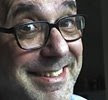1. Webb is a netroots candidate. He was backed by the people not the machine (as Kos fairly gloats this morning.)
2. He listed four areas where the Democrats were eager to cooperate with the administration, even though only three of them had actually shown up in Bush's address: The four: education, healthcare, energy independence and restoring New Orleans. That last one was the kicker. Bush, who told us from Jackson Square, "We will do what it takes," neglected to mention New Orleans last night.
2. He gave us two clear points of disagreement to focus on, not a laundry list.
3. The first of these points was the growing wealth gap between the very rich and the rest of us. The Republicans have not only been waging class warfare, but the Democrats have been reticent to point that out. Webb made it clear: "It takes the average worker more than a year to make the money that his or her boss makes in one day."
4. By stressing economic inequality he's clearly aligned with outspoken progressive candidates for president such as Dennis Kucinich and John Edwards. (Chris Matthews, always a bit slow on the uptake, continued to pigeon-hole Webb as a centrist, as does most of the punditry.)
5. The second major point was Iraq. And here, he blew past the current Bush revisionist history (we were making progress until 2006 when the bad guys blew up the Golden Mosque). Webb went back to the beginning and reminded us that the war was opposed by a long list of people with strong security credentials.
"...the national security adviser during the first Gulf War, the chief of staff of the army, two former commanding generals of the Central Command, whose jurisdiction includes Iraq, the director of operations on the Joint Chiefs of Staff, and many, many others with great integrity and long experience in national security affairs."6. He reminded us of his family's military service, establishing his authority to speak. His father flew in the Berlin Airlift, he and his brother both served in Viet Nam, and his son is currently in Iraq. His character established his ability to speak authoritatively.
7. He was unflinching in saying what needed to be done, in sharp contrast to the careful hedging and triangulation that is a hallmark of brand Hillary.
8. He invoked two Republican presidents to reinforce his main points: Eisenhower on ending the war, and Teddy Roosevelt on balancing the needs of Main Street against the greeds of Wall Street.
9. He asked for the order—from the President, not the viewers. Referring back to Eisenhower and Roosevelt, he said:
"These presidents took the right kind of action, for the benefit of the American people and for the health of our relations around the world. Tonight we are calling on this president to take similar action, in both areas. If he does, we will join him. If he does not, we will be showing him the way."
10. He didn't fidget.
Mickeleh's Take: President Bush will not take the kind of action that Webb asks him to take. So, Democrats, show him the way.
More: Taylor Marsh, Matt Stoller,
(Tags: Bush, SOTU, State of the Union, Democratic Reply, Jim Webb, Sen. Webb)




1 comment:
good points all. I was impressed with Webb too.
If he was a little more animated and had eyebrows, I'd say he should run for president.
Post a Comment